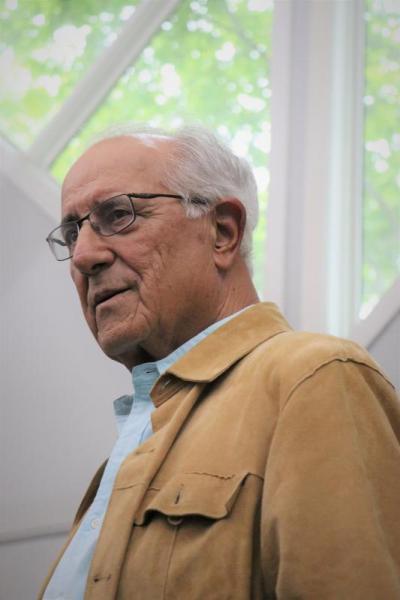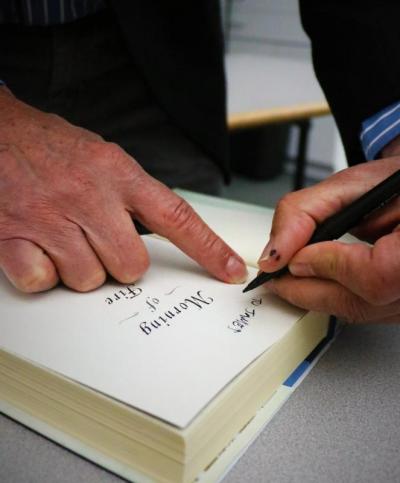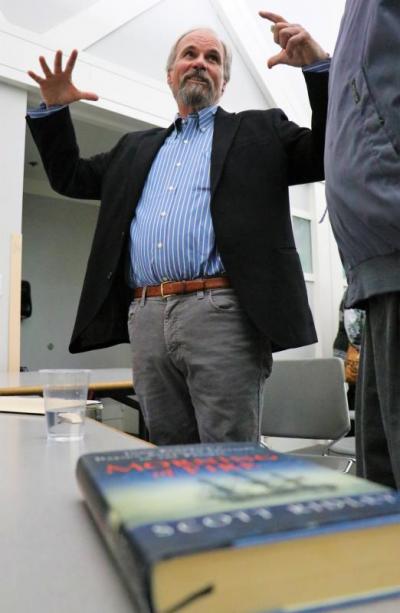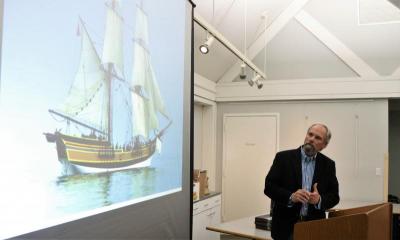Historian brings to life America’s first exploration of the Pacific



Capt. John Kendrick was a privateer during the American Revolution, the leader of a seagoing expedition that sparked the later Lewis and Clark overland exploration, the first seafaring American visitor to trade with the closed nation of Japan, and, arguably, the most famous Wareham resident of all time.
Kendrick’s life and adventures were recounted on May 23 by author and historian Scott Ridley in two presentations organized by the Wareham Library Foundation.
Kendrick’s life story will also be shared with visitors and taught as a history lesson in Wareham schools, thanks to two donations from former president of Decas Cranberry Products, Inc., John Decas, also announced at the library talks.
Kendrick has long been honored by the Wareham Historical Society with the John Kendrick Maritime Museum on Main Street, located in the house Kendrick occupied in the 1700s. But Ridley argues that the captain’s rightful place in the nation’s and world history has been largely — and wrongly — obscured by 18th century slanders spread by an ambitious rival captain.
Researching and referencing documents from the time of Kendrick’s voyages, Ridley makes the case in “Morning of Fire” and “America’s First Visit to Japan” that it was Kendrick who deserves credit for first trading with the Native Americans living in the Pacific Northwest. He argues that it was Kendrick’s account of trading with the Native Americans that spurred President Thomas Jefferson to dispatch Meriwether Lewis and William Clarke to cross the continent.
Kendrick also deserves credit for being the first American to trade with Japan in 1791, years before the two countries established a formal trading agreement in 1854.
“Going to the Pacific from the Atlantic Ocean at that time was like going to Mars,” said Ridley. “Kendrick was the first pioneer and other Americans began following his route afterward.”
Ridley, who dedicated four years to writing “Morning of Fire,” said he had to go to great lengths to find credible sources, searching through Spanish, British, and Hawaiian archives.
“A lot of the personal documents that Kendrick had on board his ship were gone,” said Ridley. “I found letters that he wrote to other people, some documents I found in different archives and some I got from the federal government.”
Kendrick died in 1794 in the Hawaiian Islands, but he left a legacy that lives on to this day and is celebrated in both the United States and Japan. His explorations opened up the Cape Horn trade route.
“Kendrick’s voyage helped shape the destiny of our country. Unlike other voyagers after him, he wasn't looking to only trade fur, but also to establish a long-lasting relationship between the United States and Japan,” said Ridley. “History has real power in our lives, and is a fabric of our society.”
President of the Wareham Library Foundation, Liz Wiley, announced that John Decas was making a donating of $10,000 to help educate the community about Kendrick.
Of that amount, $10,000 will be used to help incorporate Kendrick material into Wareham schools’ history curriculum and to develop an educational website. Five thousand will go toward constructing a Kendrick exhibit at the library and enhancing the Kendrick Museum at 100 Main St.
In brief remarks, Decas said the donation was in memory of his late brother George who “did so much work with the Wareham Historical society and was very active in protecting the best interests of the museum and keeping it from getting taken down.”














